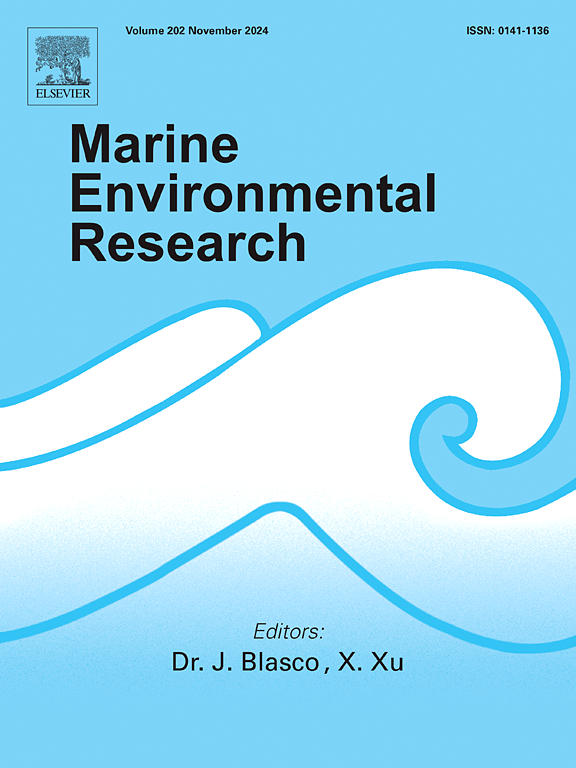Laboratory experiments revealed different bleaching susceptibilities to heat stress in eight species of subtropical urban corals
IF 3
3区 环境科学与生态学
Q2 ENVIRONMENTAL SCIENCES
引用次数: 0
Abstract
Understanding species' susceptibility to environmental stressors is crucial for conservation planning, but such data are unavailable for many subtropical corals. We therefore conducted 1-month laboratory experiments to determine the heat stress susceptibility of eight species from subtropical areas by exposing them to 32 °C (treatment) or 25 °C (control). Four species (Dipsastraea rotumana, Echinophyllia aspera, Pavona decussata, and Platygyra carnosa) survived the whole experiment, although bleaching occurred after one to two weeks of exposure. The heat exposure caused total mortality in the other four species: on day 2 in Acropora solitaryensis, day 7 in Acropora digitifera, day 9 in Acropora pruinosa, and day 17 in Montipora peltiformis. These results suggest that repeated heatwaves may cause changes in coral communities by causing disproportionally high mortality of heat-sensitive species. Coral species tested in this study, collected from subtropical reefs previously thought to be refuges for coral reefs under global warming, demonstrated greater susceptibility to heat stress than their tropical counterparts. This raises concerns about the persistence of coral reefs as sea surface temperatures continue to rise.
室内实验揭示了8种亚热带城市珊瑚对热胁迫的敏感性不同
了解物种对环境压力的易感性对于保护规划至关重要,但对于许多亚热带珊瑚来说,这些数据是不可用的。为此,我们进行了为期1个月的实验室实验,通过将8种来自亚热带地区的植物暴露在32°C(处理)或25°C(对照)的环境中,来确定它们对热胁迫的易感性。尽管暴露一到两周后出现了白化现象,但有四种植物(双斑蝶、刺槐、斑蝶和鸭嘴兽)在整个实验中存活了下来。热暴露对其他4种昆虫的总死亡率分别为:单株Acropora solitaryensis第2天、数字化Acropora第7天、pruinosa第9天、peltiformis第17天。这些结果表明,反复的热浪可能会导致对热敏物种不成比例的高死亡率,从而导致珊瑚群落的变化。在这项研究中测试的珊瑚物种,收集自亚热带珊瑚礁,以前被认为是全球变暖下珊瑚礁的避难所,显示出比热带同行更容易受到热应激。随着海面温度持续上升,这引起了人们对珊瑚礁持久性的担忧。
本文章由计算机程序翻译,如有差异,请以英文原文为准。
求助全文
约1分钟内获得全文
求助全文
来源期刊

Marine environmental research
环境科学-毒理学
CiteScore
5.90
自引率
3.00%
发文量
217
审稿时长
46 days
期刊介绍:
Marine Environmental Research publishes original research papers on chemical, physical, and biological interactions in the oceans and coastal waters. The journal serves as a forum for new information on biology, chemistry, and toxicology and syntheses that advance understanding of marine environmental processes.
Submission of multidisciplinary studies is encouraged. Studies that utilize experimental approaches to clarify the roles of anthropogenic and natural causes of changes in marine ecosystems are especially welcome, as are those studies that represent new developments of a theoretical or conceptual aspect of marine science. All papers published in this journal are reviewed by qualified peers prior to acceptance and publication. Examples of topics considered to be appropriate for the journal include, but are not limited to, the following:
– The extent, persistence, and consequences of change and the recovery from such change in natural marine systems
– The biochemical, physiological, and ecological consequences of contaminants to marine organisms and ecosystems
– The biogeochemistry of naturally occurring and anthropogenic substances
– Models that describe and predict the above processes
– Monitoring studies, to the extent that their results provide new information on functional processes
– Methodological papers describing improved quantitative techniques for the marine sciences.
 求助内容:
求助内容: 应助结果提醒方式:
应助结果提醒方式:


